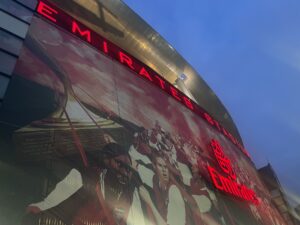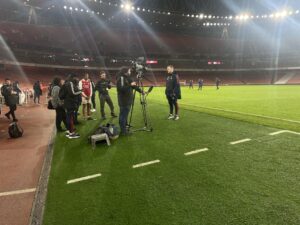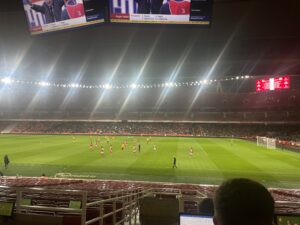Understanding Jack Wilshere, the manager

Waiting by the side of the Emirates Stadium pitch following a victory for Arsenal under-18’s against Cambridge United in the FA Youth Cup, it is impossible to escape the sensation of feeling old.
Those who have just finished playing out an entertaining 3-2 win for the hosts on the hallowed turf only minutes ago are not old enough to have taken their A Levels. Jack Wilshere, still only 31 years old, is now head coach of the youth side and is close to wrapping up club media duties.
Wilshere is still understandably in a state of fitness that suggests he could play, but the energy with which he approaches his post-match obligations belies both an unconvincing victory against a category three academy outfit and the way in which his on-field career was so unfairly disrupted.
Potentially a leading figure for an Arsenal team that felt perennially on the cusp of success, injury ensured his role was predominantly bit-part. The way in which physiological issues robbed those who loved watching Wilshere of enjoyment was cruel, the toll it took on the man himself was surely excruciating.
Before turning his attention to the small huddle of journalists trying their best not to succumb to frostbite on a deceptively chilly night in north London, Wilshere is stopped by Cambridge player Glenn McConnell as he goes through a warm down routine.
“You were my hero Jack,” was all that could be made out before Wilshere took the teenager aside to offer some words of advice and encouragement in private.
The boyish quiff that was a hallmark of Wilshere’s early playing career is back, replacing the shaved head of those difficult final on-field seasons, and it bounces in the wind as he makes his way over for questioning. He seems to be enjoying football once again.
“Cambridge were top, I just went in (their dressing room) and spoke to their team,” he revealed, unprompted.
“We expected them to have heart and be tough to play against, but the quality they have on the pitch..” Wilshere puffs out his cheeks in appreciation before extolling the virtues of an opposition midfield that included George Hoddle, the nephew of former Tottenham favourite Glenn.

The League One club brought almost 3,000 supporters to the Emirates after reaching the quarterfinals of the Youth Cup for the first time. Hard core away day regulars mixed with players’ parents to create something like a competitive atmosphere. Wilshere believed it played a part in an invaluable experience for his youngsters.
“It was so good for the boys. It’s another step in their development to play in front of fans, experience a hostile atmosphere,” he said. “They usually play in front of 80 people, sometimes less.
“It gets their name out there as well. They can enjoy these moments and really feel like they are part of the club.”
Arsenal had overwhelmed the visitors in the opening quarter of the game. Ethan Nwaneri, who became the youngest ever Arsenal first-team player when he featured against Brentford in September 2022 at the age of 15, gave the Gunners the lead with a fierce, Wilshere-like left-footed drive from the edge of the penalty area.
The head coach’s regular bouts of gesticulation on the touchline were the clearest sign that his side did not have it all their own way for the rest of the evening though. Wilshere admitted afterwards that he had attempted to head every ball and fly into every tackle from the confines of his technical area, yet even he could do little to prevent Cambridge drawing level.
The visitors, who knocked out nine-time winners Chelsea in the fourth round, proved a constant threat from set-pieces throughout and equalised when Arsenal defender Josh Robinson unwittingly nodded a corner into his own net.
Wilshere was down the tunnel before anyone else as the half-time whistle went to surely deliver a warning against complacency, yet his side continued to struggle with Cambridge’s aerial prowess after the break and found themselves 2-1 down with twenty minutes to play.
An Amario Cozier-Duberry penalty provided Wilshere with some relief, although it was only in the third minute of stoppage time that he was able to unload any sizeable amount of the passion that made him such a watchable player, falling to his knees as Michal Rosiak knocked in a winner.
“When we scored I fell over!” he said. “I love it, I love every minute of it. It probably looked like I didn’t, but I love it. I love football, I love competing, I love being part of this.
“When you’ve got a group that has that fight, that spirit. Honestly, it’s a pleasure.”

Before dominating Premier League midfield battles as a teenager or evading the clutches of Xavi, Iniesta and Busquets in Champions League wins on the carpet-like surface behind him, Wilshere was starring in the Youth Cup himself.
He won the competition in 2009 alongside the likes of Kyle Bartley, Francis Coquelin and Emmanuel Frimpong, and was in no doubt as to its benefits as his youngsters claimed their place in the semi-finals.
“I speak to them about my experiences,” Wilshere said. “I spoke to them today about how important these memories are.
“For these boys it is the biggest moment of their careers to date. I said to them ‘you will have so many bigger nights’, but this is the first time they’ve had a big moment.”
Wilshere was only appointed as head coach of the under-18s last summer having brought an end to his playing career at Danish Superliga club Aarhus just weeks beforehand.
After spending the Cambridge game glued to the edge of his technical area a la Mikel Arteta, he admits that he is still trying to find his bespoke managerial style.
“I’m working it out to be honest!” he replied when asked what sort of manager he sees himself becoming. “Some games I’m different, some games I’m on the edge. I don’t know, I just love it.”
Should his first season in management end in cup glory, the excitement around Wilshere the promising young manager may even rival that which surrounded Wilshere the brilliant young midfielder.
Success aside, he at least seems to have found a home at Arsenal again after circumstances beyond his control forced him into the wilderness for far too long.
Read Next:
There’s more to Saudi Arabian football than Cristiano Ronaldo and his Al Nassr move